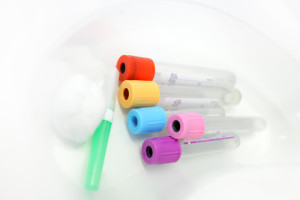Routine blood tests for pulmonary hypertension patients
There are several blood tests that may be performed routinely on pulmonary arterial hypertension patients. While none of these  tests specifically diagnose pulmonary hypertension they are very useful in managing the disease. Below are some of the routine blood tests performed.
tests specifically diagnose pulmonary hypertension they are very useful in managing the disease. Below are some of the routine blood tests performed.
BNP: B-type Natriuretic Peptide in pulmonary hypertension patients
A BNP is used to look for heart failure. If the levels are elevated in the blood, the heart is under strain and failing. This is useful in pulmonary hypertension patients as it may confirm that the pulmonary artery pressures, and therefore right heart failure, are being controlled by the current therapies a patient is on. Or it may reveal that the right heart is stressed due to elevated pressures in the pulmonary arteries and excess fluid in the body. If the level is elevated, changes may be made to medications or additional tests such as an echocardiogram may be ordered.
BMP: Basic Metabolic Panel, a common test for pulmonary hypertension patients
A BMP measures some basic electrolytes and basic kidney function and includes glucose, calcium, sodium, potassium, chloride, CO2 (carbon dioxide, bircarbonate), BUN (blood urea nitrogen), and creatinine. This test is important as many PAH patients are on diuretics, which can lead to wasting of important electrolytes or to renal damage if not monitored closely. This test is usually done at the first visit with the pulmonary hypertension expert and periodically over the course of treatment. It is a very useful test to perform after making changes to diuretic doses as it will allow the physician to see if the patient’s body is tolerating the medication.
CMP: Complete Metabolic Panel, a useful test for pulmonary hypertension patients
The CMP is a BMP plus albumin, total protein, ALP (alkaline phosphatase), ALT (alanine amino transferase) AST (aspartate amino transferase), and bilirubin. This test is used when the physician wants to measure basic electrolytes, renal function, and liver function. This test is useful in pulmonary hypertension for the same reason a BMP is, plus it has the added benefit of measuring liver function.
It is important to measure liver function for multiple reasons. The increased pressure in the pulmonary arteries leads to the right side of the heart not pumping efficiently, which leads to blood backing up in the body and hepatic (liver) congestion, which can cause damage to the organ. Some endothelin receptor antagonists (ERAs) have been shown to have a low risk of liver damage as well so it is important to check monthly liver function tests.
LFTs: Liver Function Tests, used to monitor safety of certain pulmonary hypertension treatments
Liver function tests are used to screen for, detect, evaluate, and monitor for liver inflammation and damage. The panel includes ALT (Alanine aminotransferase), ALP (Alkaline phosphatase), AST (Apartate aminotransferase), bilirubin, albumin, and total protein. It is important to measure liver function for multiple reasons. The increased pressure in the pulmonary arteries leads to the right side of the heart not pumping efficiently, which leads to blood backing up in the body and hepatic (liver) congestion, which can cause damage to the organ. Some endothelin receptor antagonists (ERAs) have been shown to have a low risk of liver damage as well so it is important to check monthly liver function tests. The LFT panel offers more complete information on the liver and how well it is functioning than a CMP.
CBC: Complete Blood Count, commonly performed on pulmonary hypertension patients
 The complete blood count or CBC is a panel of tests that examines different parts of the blood and includes a white blood cell count (WBC), red blood cell count (RBC), hemoglobin, hematocrit, platelet count, mean corpuscular volume (MCV), mean corpuscular hemoglobin (MCH), mean corpuscular hemoglobin concentration (MCHC), and red cell distribution width (RDW). This test can help detect infection, anemia, and other specific hematological abnormalities. Since pulmonary hypertension patients are on different types of drugs that effect different levels in the CBC, this is an important test to monitor. Some endothelin receptor antagonists (ERAs) can lower a patient’s hematocrit, immunosupressants can lower the white blood cell count, and some prostacyclins lower platelet counts. This test is usually performed during or shortly after the first visit with a pulmonary hypertension expert and at routine intervals throughout treatment.
The complete blood count or CBC is a panel of tests that examines different parts of the blood and includes a white blood cell count (WBC), red blood cell count (RBC), hemoglobin, hematocrit, platelet count, mean corpuscular volume (MCV), mean corpuscular hemoglobin (MCH), mean corpuscular hemoglobin concentration (MCHC), and red cell distribution width (RDW). This test can help detect infection, anemia, and other specific hematological abnormalities. Since pulmonary hypertension patients are on different types of drugs that effect different levels in the CBC, this is an important test to monitor. Some endothelin receptor antagonists (ERAs) can lower a patient’s hematocrit, immunosupressants can lower the white blood cell count, and some prostacyclins lower platelet counts. This test is usually performed during or shortly after the first visit with a pulmonary hypertension expert and at routine intervals throughout treatment.
TSH: Thyroid Stimulating Hormone blood test is used to evaluate for thyroid abnormalities in pulmonary hypertension patients.
The TSH test is often the test of choice for evaluating thyroid function and/or symptoms of hyperthyroidism or hypothyroidism. There is thought to be an association between pulmonary arterial hypertension (PAH) and thyroid disease although it is not well understood. Most thyroid disorders are easily treated so it is important to diagnosis them with this blood test.
Human Chorionic Gonadotropin is tested monthly for some PH patients
HCG is a blood pregnancy test. Two types of blood HCG can be ordered, a quantitative HCG and a qualitative HCG. The qualitative test gives a simple positive (pregnant) or negative (not pregnant) result. The quantitative test is more in depth and gives a numerical result that can estimates how far along a pregnancy is. Pulmonary hypertension patients in general should not become pregnant, as their hearts do very poorly with the increased blood volume associated in pregnancy. Certain drugs such endothelin receptor antagonists (ERAs) are known to be teratogenic (cause birth defects) so pregnancy must be avoided and monthly pregnancy tests are required while taking this class of medication. The HCG can also be measured in the urine.
